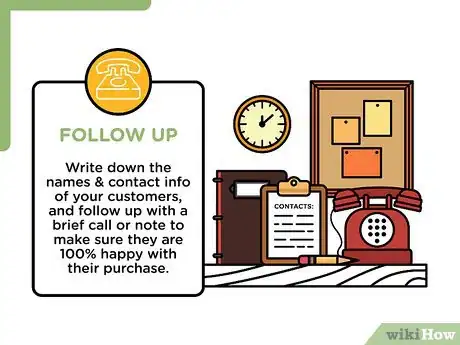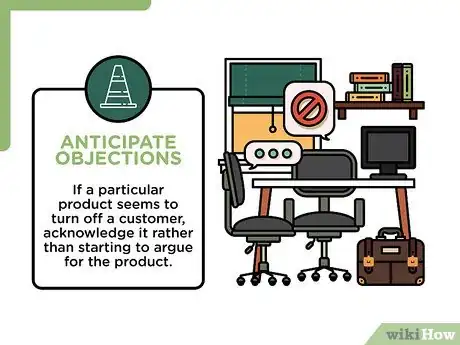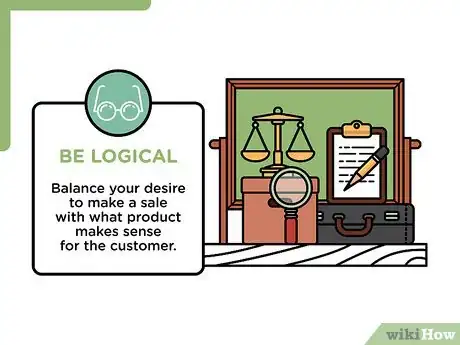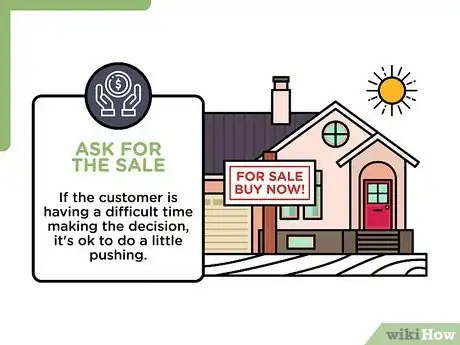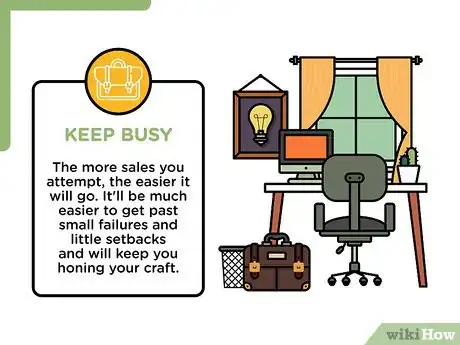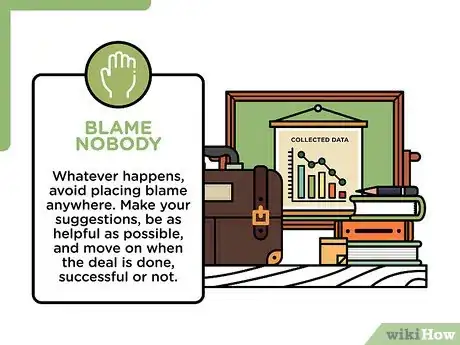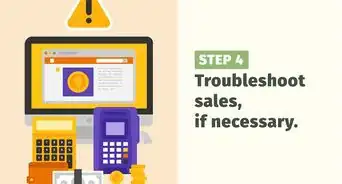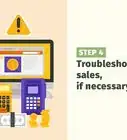This article was co-authored by Maureen Taylor. Maureen Taylor is the CEO and Founder of SNP Communications, a leadership communications company based in the San Francisco Bay Area. She has been helping leaders, founders, and innovators in all sectors hone their messaging and delivery for almost 30 years, and has worked with leaders and teams at Google, Facebook, Airbnb, SAP, Salesforce, and Spotify.
wikiHow marks an article as reader-approved once it receives enough positive feedback. This article received 28 testimonials and 82% of readers who voted found it helpful, earning it our reader-approved status.
This article has been viewed 680,246 times.
Sales is an art. Part assertive, part passive, if you balance the persuasion and charisma of a great salesperson, you'll be able to sell ketchup popsicles to a woman in white gloves on the 4th of July (although something slightly more practical is recommended). Read on to discover how to cultivate trustworthiness, an assertive presence, and an optimistic outlook on your sales.
Steps
Being Trustworthy
-
1Put the customer first. You can't sell anyone anything if they don't trust you. Convincing someone that they need something you're selling requires that you balance sincerity with your desire to make the sale, being assertive, firm, and honest. If they don't trust you, they're less willing to make an intelligent buying decision.[1]
-
2Empathize. Find out what your customer really wants and why they want it. People buy "things" as a means to an end. Understanding your customer's desires and adopting them yourself will make you a great salesman.[2]
- Allow your customer to lead interactions, and ask questions to determine their desires. If a customer says they want a suit, ask "What's the occasion?" Selling a suit to someone going to a funeral is a lot different than selling to someone who is celebrating a recent promotion.
- If a customer expresses interest in a particular item, ask what it is they like about it. Allow them to choose the product that they feel good about, getting to know your customer and their taste, and uncovering their real motivation for buying.
Advertisement -
3Be an expert in your field. Know everything there is to know about your product, and your competitors products, so that you can justify to your customer why your recommended product is the right one for them.
- If you're selling basketball shoes, learn which players wear what shoes, what styles are collectible, and some of the history of the shoes. Likewise, learn all the technical details about sizing, comfort, and care for the product.
-
4Follow up. If you really want to be a great salesman, go the extra mile. Write down the names and contact info of your customers, and follow up with a brief call or note to make sure they are 100% happy with their purchase. This is how you turn customers into raving fans who will return to you in the future. This is how you get referrals from your customers, and promotions from your employer.[3]
-
5Look the part. There's no particular style--a car salesman will probably dress somewhat differently than a salesperson at a guitar shop--but you need to figure out how to look as appropriate and approachable as possible. Be clean, appropriately groomed, and friendly.
Being Assertive
-
1Anticipate objections. Pay close attention to your customers reactions. Facial expressions and body language can be a big "tell" in the customer's attitude. As you pitch the product to them, remember that you are there to sell whatever is going to make the customer feel really good about their purchase. Guessing what part of the product or price the customer is objecting to will help you respond tactfully and persuasively.[4]
- If a particular product seems to turn off a customer, acknowledge it rather than starting to argue for the product. You might objectively name some of its merits while justifying the customer's hesitation: "It is more expensive than the others, you're right. The hand-stitching takes a lot more time to complete, but it results in much more durable shoe."
-
2Be logical. If you're working on commission, it can be tempting to always up-sell or try to get customers interested in the most expensive items. But trying to up-sell a big screen plasma TV to someone living in a dorm room that isn't big enough for it is likely to put your customer off of your sales style. Balance your desire to make a sale with what product makes sense for the customer.
-
3Ask for the sale. If the customer is having a difficult time making the decision, it's ok to do a little pushing. Trust that you have suggested the best item and ask something like "Would you like me to bring this up to the check out stand for you while you continue your shopping?"
-
4Increase your units per transaction. After you confirm a sale, make the case for add-ons to up your total sales. If you've just sold a printer, mention some deals you're running on ink cartridges or reams of paper. Frame it as a money and stress-saving measure for them: "You'll need these eventually and this way you won't have to worry about it."
Staying Optimistic
-
1Forget bad sales. Spending lots of time on a sale that falls through can be frustrating and discouraging, but learning to put bad sales behind you and quickly approach new opportunities afresh is the best way to become a more successful salesperson.
- Treat each failed sale as practice. What did you learn from it?
-
2Stay focused on your own sales. Some workplaces try to stimulate sales by encouraging competition among the sales staff, posting numbers for the week or the month.[5] While this can be a friendly way of selling enthusiastically, it can also be discouraging if you constantly compare yourself to other salespeople.
- Celebrate if you do sell a lot, but don't make that your goal. Treat work as work. Fill your free time with other hobbies to avoid dwelling on making sales.
-
3Keep busy. The more sales you attempt, the easier it will go. It'll be much easier to get past small failures and little setbacks and will keep you honing your craft. If you're making calls or roving the sales floor, the day will likewise go a lot faster the more time you spend selling.
-
4Blame nobody. Whatever happens, avoid placing blame anywhere. It's ultimately the customer's decision whether or not to buy something, so don't treat it as a failure on your part if they choose not to. Think of yourself as a counsellor in a transaction. Make your suggestions, be as helpful as possible, and move on when the deal is done, successful or not.
Expert Q&A
-
QuestionHow do you know what your customers want before they do?
 Maureen TaylorMaureen Taylor is the CEO and Founder of SNP Communications, a leadership communications company based in the San Francisco Bay Area. She has been helping leaders, founders, and innovators in all sectors hone their messaging and delivery for almost 30 years, and has worked with leaders and teams at Google, Facebook, Airbnb, SAP, Salesforce, and Spotify.
Maureen TaylorMaureen Taylor is the CEO and Founder of SNP Communications, a leadership communications company based in the San Francisco Bay Area. She has been helping leaders, founders, and innovators in all sectors hone their messaging and delivery for almost 30 years, and has worked with leaders and teams at Google, Facebook, Airbnb, SAP, Salesforce, and Spotify.
Corporate Communications Advisor Let your customer talk before you jump into your pitch. Encourage your customer to talk about their issues or problems. Then, you can let them know how you can help them, with a better understanding of what they actually need.
Let your customer talk before you jump into your pitch. Encourage your customer to talk about their issues or problems. Then, you can let them know how you can help them, with a better understanding of what they actually need. -
QuestionWhat should a salesperson keep in mind before going to assist a customer?
 Community AnswerAlways be positive and polite and listen to the customer's needs. You won't know what the customer needs until they tell you. Try to create a solution for what they need. Even if it doesn't work out, always stay positive.
Community AnswerAlways be positive and polite and listen to the customer's needs. You won't know what the customer needs until they tell you. Try to create a solution for what they need. Even if it doesn't work out, always stay positive. -
QuestionHow do I overcome shyness with customers?
 Community AnswerLearn about the products you are selling. As much as you can. If you feel like you have full product knowledge and can answer any of your customers' questions, you start to feel confident, and over time the shyness goes away.
Community AnswerLearn about the products you are selling. As much as you can. If you feel like you have full product knowledge and can answer any of your customers' questions, you start to feel confident, and over time the shyness goes away.
References
- ↑ https://www.inc.com/dan-enthoven/3-reasons-why-sales-credibility-matters-more-than-ever.html
- ↑ https://hbr.org/2018/09/to-get-employees-to-empathize-with-customers-make-them-think-like-customers
- ↑ https://salesethics.net/blog/why-follow-up-is-important-after-a-successful-sale/
- ↑ http://www.inc.com/geoffrey-james/5-traits-of-highly-successful-salesmen.html
- ↑ http://greatist.com/happiness/how-be-optimistic-about-everything
About This Article
To be a great salesman, make sure to empathize with your customer’s needs by asking questions like “What’s the occasion” so you can sell them a product they feel good about. Additionally, get to know everything about your product, as well as those of your competitors, so you can justify why your product is superior. If the customer seems hesitant, acknowledge their objections while stating the product’s merits by saying something like “It is more expensive than the others, but the hand-stitching makes for a more durable shoe.” For more tips, like how to follow up with your customers, read on!



